homepage news
YEAR IN REVIEW: Top 10 international stories of the year
The world hates Trump; hurricanes create havoc
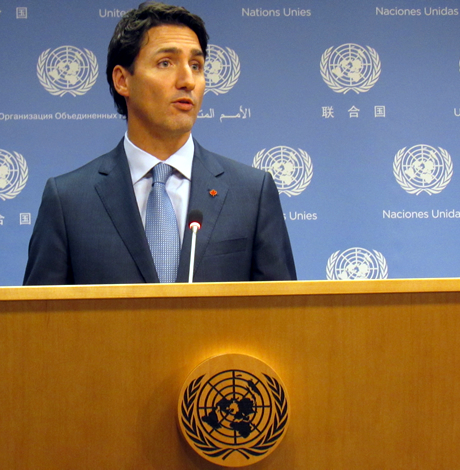
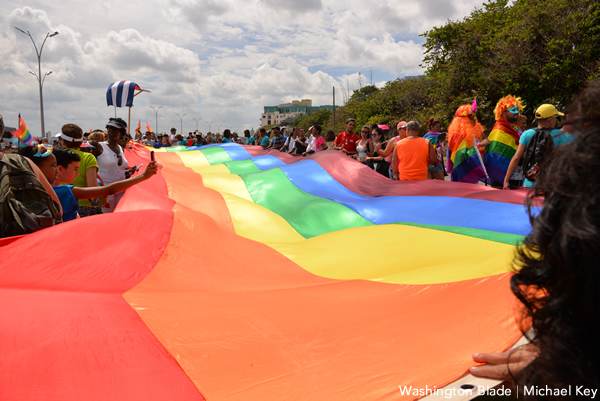
Supporters of Mariela Castro, daughter of Cuban President Raúl Castro, take part in an International Day Against Homophobia and Transphobia March in Havana on May 13, 2017. (Washington Blade photo by Michael Key)
Here are the top 10 international LGBT news stories of 2017, as ranked by the Washington Blade’s editorial staff.
#10. Trump rolls back normalized U.S., Cuba relations
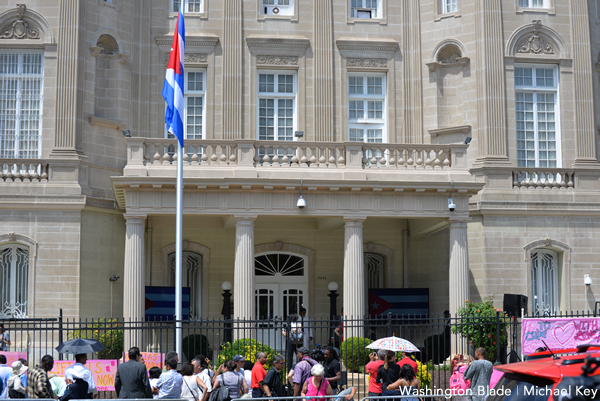
The Cuban Embassy on 16th Street, N.W., in Northwest Washington.(Washington Blade photo by Michael Key)
President Trump on June 16 reinstated travel and trade restrictions with Cuba.
The directive that Trump signed at a theater in Miami’s Little Havana neighborhood bans individual “people-to-people” trips to the Communist island. It also says Americans who travel to Cuba on organized trips must “engage in a full-time schedule of activities that enhance contact with the Cuban people, support civil society in Cuba, or promote the Cuban people’s independence from Cuban authorities.”
Then-President Obama in 2014 announced the U.S. would begin to normalize relations with Cuba.
Mariela Castro, the daughter of Cuban President Raúl Castro who spearheads LGBT-specific issues, is among those who remain highly critical of the U.S. embargo against Cuba that remains in place. The Cuban government said Trump’s policy favors an “extreme minority” of exiles who live in Florida.
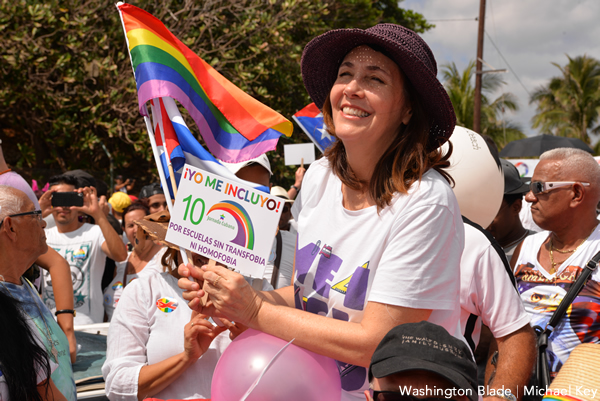
Mariela Castro, daughter of Cuban President Raúl Castro, leads an LGBT march through Havana on May 13, 2017. (Washington Blade photo by Michael Key)
9. LGBT candidates around the world win election
A number of prominent LGBT elected officials took office around the world in 2017.
Gay Irish Prime Minister Leo Varadkar assumed office on June 14. Ana Brnabić on June 29 became Serbia’s first woman and openly lesbian prime minister.
Michelle Súarez, who is the first openly transgender person elected to the Uruguayan Senate, was officially sworn in on Oct. 11. Diane Rodríguez earlier this year won a seat in Ecuador’s congress when she ran on the ticket of current Congressman Carlos Vera.
8. LGBT-inclusive Colombian peace agreement implemented
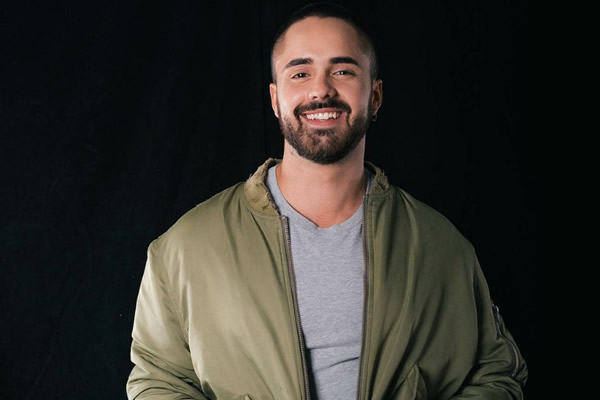
Pedro Santos, who’s gay, told the Blade his father, former Vice President Francisco Santos, strongly opposes the peace agreement. (Photo courtesy Santos)
The Colombian government and the Revolutionary Armed Forces of Colombia in 2017 began to implement an LGBT-inclusive peace agreement that ended a decades-long war.
Representatives of Caribe Afirmativo and Colombia Diversa — two LGBT advocacy groups — are among those who took part in peace talks that took place in Havana. Caribe Afirmativo has opened four “Houses of Peace” in northern Colombia in support of the agreement.
Voters in October 2016 narrowly rejected the agreement in a referendum. The country’s Congress later ratified it after President Juan Manuel Santos renegotiated it.
Santos’ gay nephew, Pedro Santos, told the Washington Blade in September during an interview in the Colombian capital of Bogotá that his father, former Vice President Francisco Santos, strongly opposes the agreement. Pedro Santos nevertheless said he is willing to support the agreement’s implementation.
“I can just cry about it and try to deny it happened or help people and try to make it work,” he said, referring to the war that killed more than 200,000 people.
7. Hurricanes devastate Caribbean LGBT communities
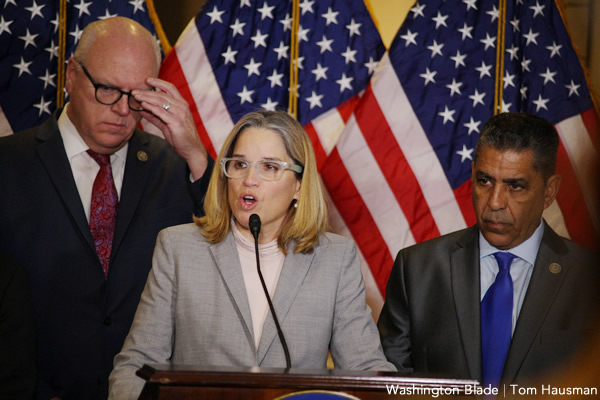
San Juan Mayor Carmen Yulín Cruz has criticized the Trump administation’s response to the hurricanes. (Washington Blade photo by Tom Hausman)
Hurricanes Irma and Maria caused widespread destruction throughout the Caribbean in September.
Irma caused widespread destruction in Barbuda, St. Barts, St. Martin, Anguilla, the U.S. and British Virgin Islands, the Turks and Caicos and the Florida Keys. It also damaged an LGBT community center in Santo Domingo, Cuba, when it made landfall on the island’s north central coast on Sept. 9 with 160 mph winds.
Maria made landfall in Puerto Rico on Sept. 20 with 155 mph winds. The hurricane caused widespread damage in Dominica and St. Croix before hitting the U.S. commonwealth.
People with HIV/AIDS who live on the hurricane-battered islands were unable to access medications in the aftermath of the storms.
Activists in Puerto Rico with whom the Blade spoke after Maria said the hurricane has made LGBT people even more vulnerable to discrimination because of their sexual orientation and gender identity. San Juan Mayor Carmen Yulín Cruz — who champions LGBT rights in the U.S. commonwealth — remains among the most vocal critics of the federal government’s response to Maria.
6. Anti-LGBT violence persists
Violence based on sexual orientation and gender identity remained pervasive throughout the world in 2017.
David Valle, a prominent LGBT rights advocate in Honduras, was brutally attacked inside his home in the country’s capital of Tegucigalpa in July. Karla Avelar, executive director of Comunicando y Capacitando a Mujeres Trans, a Salvadoran trans advocacy group, in October sought refuge in Ireland after she received death threats.
She spoke with the Blade on Sept. 22 in her office in the Salvadoran capital of San Salvador.
“To work in the fight for the human rights of my community is part of my conviction,” she said. “This is the vision that I have for the future, to see that my country gets better.”
U.N. High Commissioner for Human Rights Zeid Ra’ad al-Hussein earlier this month acknowledged during a Capitol Hill panel that anti-LGBT violence persists around the world. He specifically cited a Slovenian activist who told him in September that homophobic attacks have increased “very suddenly” in his country, despite efforts to extend rights to the country’s LGBT community.
“When you’re fighting for rights, you don’t relax for one moment,” said al-Hussein.
5. More countries legalize marriage
Same-sex couples in several countries won marriage rights in 2017.
The Australian House of Representatives on Dec. 7 nearly unanimously approved a same-sex marriage bill. Gays and lesbians can begin to marry in the country on Jan. 9.
Lawmakers in Germany and Malta in 2017 approved measures that extended marriage rights to same-sex couples.
The Austrian Constitutional Court on Dec. 5 ruled same-sex couples will be able to tie the knot by the beginning of 2019. The Taiwanese Constitutional Court on May 24 said same-sex couples will be able to legally marry if lawmakers fail to “amend or enact relevant laws” within two years.
Chilean President Michelle Bachelet on Aug. 28 introduced a bill that would extend marriage and adoption rights to same-sex couples. Lawmakers in Bermuda this month approved a bill that would rescind marriage rights for same-sex couples in the British territory.
4. World leaders promote LGBT rights
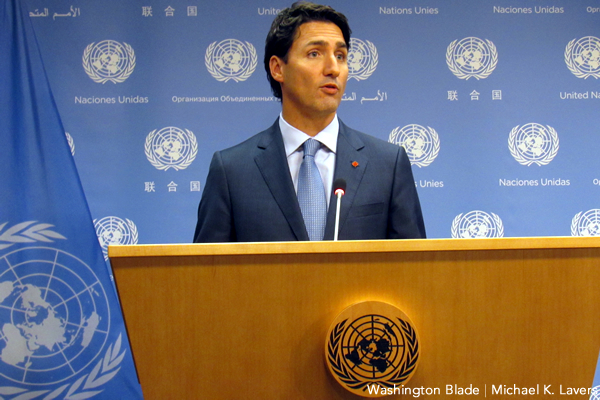
Canadian Prime Minister Justin Trudeau apologized to Canadians who suffered persecution under his country’s laws.(Washington Blade photo by Michael K. Lavers)
Canadian Prime Minister Justin Trudeau is among the world leaders who championed LGBT rights in 2017.
Trudeau on Nov. 28 apologized to Canadians who suffered persecution and discrimination under his country’s anti-LGBT laws and policies. Trudeau, along with French President Emmanuel Macron and German Chancellor Angela Merkel, has publicly condemned the crackdown against LGBT Chechens that began earlier this year.
Bachelet on Aug. 28 introduced a bill that would extend marriage and adoption rights to same-sex couples. She has also urged Chilean lawmakers to approve a trans rights bill.
Panamanian First Lady Lorena Castillo was the grand marshal of Panama City’s Pride parade in July. Costa Rican Vice President Ana Helena Chacón — who, like Castillo, is a vocal supporter of LGBT rights, is among those who spoke at a same-sex marriage conference that took place in her country’s capital of San José in November.
3. Australia voters back same-sex marriage
A majority of Australian voters who participated in a non-binding plebiscite on whether to extend marriage rights to same-sex couples voted “yes.”
The results that the Australian Bureau of Statistics announced on Nov. 14 indicated 61.6 percent of voters said “yes,” compared to 38 percent of voters who said “no.” Nearly 80 percent of eligible voters took part in the plebiscite for which Prime Minister Malcolm Turnbull called
Australian lawmakers approved a same-sex marriage bill less than a month later.
Alex Greenwich, a member of the New South Wales Parliament who co-chairs Australian Marriage Equality, a group that campaigned in support of the issue, told the Blade on Dec. 10 during the Victory Institute’s International LGBTQ Leaders Conference in D.C. the plebiscite “was an experience nobody wanted.” Greenwich nevertheless added the “yes” campaign “galvanized people like never before to support their LGBTI friends and family members.”
2. Anti-LGBT crackdowns in Chechnya, Egypt

Russian President Vladimir Putin has sought to dismiss reports of an anti-gay crackdown in Chechnya. (Photo by World Economic Forum; courtesy Wikimedia Commons)
Anti-LGBT crackdowns in several parts of the world made headlines in 2017.
Novaya Gazeta, an independent Russian newspaper, in April reported authorities in Chechnya have arrested more than 100 men because of their sexual orientation since the beginning of the year. At least three of these men died after their arrest, while others were beaten and tortured and sent to a secret prison.
The crackdown has also targeted women they suspect are lesbians.
The Kremlin has claimed it has launched an investigation into the allegations, even though Russian President Vladimir Putin has sought to downplay or even dismiss these reports. Chechen President Ramzan Kadyrov, who is a close Putin ally, in July said he doesn’t “have any gays” in the semi-autonomous Russian republic.
Human rights advocates have said Egyptian authorities since September have arrested dozens of LGBT people. They have also criticized officials in Azerbaijan for arresting more than 80 people in September on grounds they were protecting public morality and health.
1. Trump sparks outrage around the world
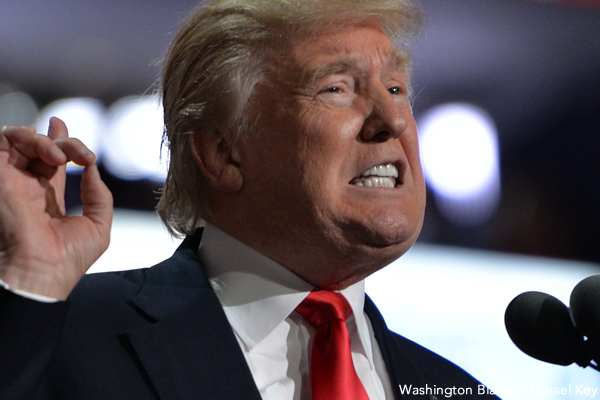
The world hates Donald Trump. (Washington Blade photo by Michael Key)
LGBT rights advocates around the world in 2017 were sharply critical of President Trump and his foreign policy.
Andrea Ayala, executive director of Espacio de Mujeres Lesbianas por la Diversidad, an LGBT advocacy group in El Salvador, in September described Trump’s immigration policy as “inhumane.” Ayaz Shalal, a human rights activist from Kurdistan, was unable to attend a Human Rights Campaign conference in D.C. earlier this year because Iraq was among the countries the Trump administration included in its controversial travel ban.
Iraq was not included in a revised version of the policy, but advocates remained highly critical of Trump throughout 2017.
The U.S. on Sept. 29 voted against a U.N. Human Rights Council resolution that included a provision condemning the death penalty for those found guilty of committing consensual same-sex sexual acts. Trump has also not publicly condemned the anti-LGBT crackdown in Chechnya.
Deputy Assistant Secretary of State Randy Berry is no longer the special U.S. envoy for the promotion of LGBT and intersex rights abroad. The U.S. nevertheless continues to promote these issues abroad.
Secretary of State Rex Tillerson this year acknowledged Pride month and the Transgender Day of Remembrance. The U.S., France and Brazil blocked Russian and Egyptian efforts to remove a gay-inclusive reference to discrimination from an Olympics resolution the U.N. General Assembly unanimously adopted on Nov. 13.
homepage news
Honoring the legacy of New Orleans’ 1973 UpStairs Lounge fire
Why the arson attack that killed 32 gay men still resonates 50 years later

On June 23 of last year, I held the microphone as a gay man in the New Orleans City Council Chamber and related a lost piece of queer history to the seven council members. I told this story to disabuse all New Orleanians of the notion that silence and accommodation, in the face of institutional and official failures, are a path to healing.
The story I related to them began on a typical Sunday night at a second-story bar on the fringe of New Orleans’ French Quarter in 1973, where working-class men would gather around a white baby grand piano and belt out the lyrics to a song that was the anthem of their hidden community, “United We Stand” by the Brotherhood of Man.
“United we stand,” the men would sing together, “divided we fall” — the words epitomizing the ethos of their beloved UpStairs Lounge bar, an egalitarian free space that served as a forerunner to today’s queer safe havens.
Around that piano in the 1970s Deep South, gays and lesbians, white and Black queens, Christians and non-Christians, and even early gender minorities could cast aside the racism, sexism, and homophobia of the times to find acceptance and companionship for a moment.
For regulars, the UpStairs Lounge was a miracle, a small pocket of acceptance in a broader world where their very identities were illegal.
On the Sunday night of June 24, 1973, their voices were silenced in a murderous act of arson that claimed 32 lives and still stands as the deadliest fire in New Orleans history — and the worst mass killing of gays in 20th century America.
As 13 fire companies struggled to douse the inferno, police refused to question the chief suspect, even though gay witnesses identified and brought the soot-covered man to officers idly standing by. This suspect, an internally conflicted gay-for-pay sex worker named Rodger Dale Nunez, had been ejected from the UpStairs Lounge screaming the word “burn” minutes before, but New Orleans police rebuffed the testimony of fire survivors on the street and allowed Nunez to disappear.
As the fire raged, police denigrated the deceased to reporters on the street: “Some thieves hung out there, and you know this was a queer bar.”
For days afterward, the carnage met with official silence. With no local gay political leaders willing to step forward, national Gay Liberation-era figures like Rev. Troy Perry of the Metropolitan Community Church flew in to “help our bereaved brothers and sisters” — and shatter officialdom’s code of silence.
Perry broke local taboos by holding a press conference as an openly gay man. “It’s high time that you people, in New Orleans, Louisiana, got the message and joined the rest of the Union,” Perry said.
Two days later, on June 26, 1973, as families hesitated to step forward to identify their kin in the morgue, UpStairs Lounge owner Phil Esteve stood in his badly charred bar, the air still foul with death. He rebuffed attempts by Perry to turn the fire into a call for visibility and progress for homosexuals.
“This fire had very little to do with the gay movement or with anything gay,” Esteve told a reporter from The Philadelphia Inquirer. “I do not want my bar or this tragedy to be used to further any of their causes.”
Conspicuously, no photos of Esteve appeared in coverage of the UpStairs Lounge fire or its aftermath — and the bar owner also remained silent as he witnessed police looting the ashes of his business.
“Phil said the cash register, juke box, cigarette machine and some wallets had money removed,” recounted Esteve’s friend Bob McAnear, a former U.S. Customs officer. “Phil wouldn’t report it because, if he did, police would never allow him to operate a bar in New Orleans again.”
The next day, gay bar owners, incensed at declining gay bar traffic amid an atmosphere of anxiety, confronted Perry at a clandestine meeting. “How dare you hold your damn news conferences!” one business owner shouted.
Ignoring calls for gay self-censorship, Perry held a 250-person memorial for the fire victims the following Sunday, July 1, culminating in mourners defiantly marching out the front door of a French Quarter church into waiting news cameras. “Reverend Troy Perry awoke several sleeping giants, me being one of them,” recalled Charlene Schneider, a lesbian activist who walked out of that front door with Perry.

Esteve doubted the UpStairs Lounge story’s capacity to rouse gay political fervor. As the coroner buried four of his former patrons anonymously on the edge of town, Esteve quietly collected at least $25,000 in fire insurance proceeds. Less than a year later, he used the money to open another gay bar called the Post Office, where patrons of the UpStairs Lounge — some with visible burn scars — gathered but were discouraged from singing “United We Stand.”
New Orleans cops neglected to question the chief arson suspect and closed the investigation without answers in late August 1973. Gay elites in the city’s power structure began gaslighting the mourners who marched with Perry into the news cameras, casting suspicion on their memories and re-characterizing their moment of liberation as a stunt.
When a local gay journalist asked in April 1977, “Where are the gay activists in New Orleans?,” Esteve responded that there were none, because none were needed. “We don’t feel we’re discriminated against,” Esteve said. “New Orleans gays are different from gays anywhere else… Perhaps there is some correlation between the amount of gay activism in other cities and the degree of police harassment.”

An attitude of nihilism and disavowal descended upon the memory of the UpStairs Lounge victims, goaded by Esteve and fellow gay entrepreneurs who earned their keep via gay patrons drowning their sorrows each night instead of protesting the injustices that kept them drinking.
Into the 1980s, the story of the UpStairs Lounge all but vanished from conversation — with the exception of a few sanctuaries for gay political debate such as the local lesbian bar Charlene’s, run by the activist Charlene Schneider.
By 1988, the 15th anniversary of the fire, the UpStairs Lounge narrative comprised little more than a call for better fire codes and indoor sprinklers. UpStairs Lounge survivor Stewart Butler summed it up: “A tragedy that, as far as I know, no good came of.”
Finally, in 1991, at Stewart Butler and Charlene Schneider’s nudging, the UpStairs Lounge story became aligned with the crusade of liberated gays and lesbians seeking equal rights in Louisiana. The halls of power responded with intermittent progress. The New Orleans City Council, horrified by the story but not yet ready to take its look in the mirror, enacted an anti-discrimination ordinance protecting gays and lesbians in housing, employment, and public accommodations that Dec. 12 — more than 18 years after the fire.
“I believe the fire was the catalyst for the anger to bring us all to the table,” Schneider told The Times-Picayune, a tacit rebuke to Esteve’s strategy of silent accommodation. Even Esteve seemed to change his stance with time, granting a full interview with the first UpStairs Lounge scholar Johnny Townsend sometime around 1989.
Most of the figures in this historic tale are now deceased. What’s left is an enduring story that refused to go gently. The story now echoes around the world — a musical about the UpStairs Lounge fire recently played in Tokyo, translating the gay underworld of the 1973 French Quarter for Japanese audiences.
When I finished my presentation to the City Council last June, I looked up to see the seven council members in tears. Unanimously, they approved a resolution acknowledging the historic failures of city leaders in the wake of the UpStairs Lounge fire.
Council members personally apologized to UpStairs Lounge families and survivors seated in the chamber in a symbolic act that, though it could not bring back those who died, still mattered greatly to those whose pain had been denied, leaving them to grieve alone. At long last, official silence and indifference gave way to heartfelt words of healing.
The way Americans remember the past is an active, ongoing process. Our collective memory is malleable, but it matters because it speaks volumes about our maturity as a people, how we acknowledge the past’s influence in our lives, and how it shapes the examples we set for our youth. Do we grapple with difficult truths, or do we duck accountability by defaulting to nostalgia and bluster? Or worse, do we simply ignore the past until it fades into a black hole of ignorance and indifference?
I believe that a factual retelling of the UpStairs Lounge tragedy — and how, 50 years onward, it became known internationally — resonates beyond our current divides. It reminds queer and non-queer Americans that ignoring the past holds back the present, and that silence is no cure for what ails a participatory nation.
Silence isolates. Silence gaslights and shrouds. It preserves the power structures that scapegoat the disempowered.
Solidarity, on the other hand, unites. Solidarity illuminates a path forward together. Above all, solidarity transforms the downtrodden into a resounding chorus of citizens — in the spirit of voices who once gathered ‘round a white baby grand piano and sang, joyfully and loudly, “United We Stand.”

Robert W. Fieseler is a New Orleans-based journalist and the author of “Tinderbox: the Untold Story of the Up Stairs Lounge Fire and the Rise of Gay Liberation.”
homepage news
New Supreme Court term includes critical LGBTQ case with ‘terrifying’ consequences
Business owner seeks to decline services for same-sex weddings

The U.S. Supreme Court, after a decision overturning Roe v. Wade that still leaves many reeling, is starting a new term with justices slated to revisit the issue of LGBTQ rights.
In 303 Creative v. Elenis, the court will return to the issue of whether or not providers of custom-made goods can refuse service to LGBTQ customers on First Amendment grounds. In this case, the business owner is Lorie Smith, a website designer in Colorado who wants to opt out of providing her graphic design services for same-sex weddings despite the civil rights law in her state.
Jennifer Pizer, acting chief legal officer of Lambda Legal, said in an interview with the Blade, “it’s not too much to say an immeasurably huge amount is at stake” for LGBTQ people depending on the outcome of the case.
“This contrived idea that making custom goods, or offering a custom service, somehow tacitly conveys an endorsement of the person — if that were to be accepted, that would be a profound change in the law,” Pizer said. “And the stakes are very high because there are no practical, obvious, principled ways to limit that kind of an exception, and if the law isn’t clear in this regard, then the people who are at risk of experiencing discrimination have no security, no effective protection by having a non-discrimination laws, because at any moment, as one makes their way through the commercial marketplace, you don’t know whether a particular business person is going to refuse to serve you.”
The upcoming arguments and decision in the 303 Creative case mark a return to LGBTQ rights for the Supreme Court, which had no lawsuit to directly address the issue in its previous term, although many argued the Dobbs decision put LGBTQ rights in peril and threatened access to abortion for LGBTQ people.
And yet, the 303 Creative case is similar to other cases the Supreme Court has previously heard on the providers of services seeking the right to deny services based on First Amendment grounds, such as Masterpiece Cakeshop and Fulton v. City of Philadelphia. In both of those cases, however, the court issued narrow rulings on the facts of litigation, declining to issue sweeping rulings either upholding non-discrimination principles or First Amendment exemptions.
Pizer, who signed one of the friend-of-the-court briefs in opposition to 303 Creative, said the case is “similar in the goals” of the Masterpiece Cakeshop litigation on the basis they both seek exemptions to the same non-discrimination law that governs their business, the Colorado Anti-Discrimination Act, or CADA, and seek “to further the social and political argument that they should be free to refuse same-sex couples or LGBTQ people in particular.”
“So there’s the legal goal, and it connects to the social and political goals and in that sense, it’s the same as Masterpiece,” Pizer said. “And so there are multiple problems with it again, as a legal matter, but also as a social matter, because as with the religion argument, it flows from the idea that having something to do with us is endorsing us.”
One difference: the Masterpiece Cakeshop litigation stemmed from an act of refusal of service after owner, Jack Phillips, declined to make a custom-made wedding cake for a same-sex couple for their upcoming wedding. No act of discrimination in the past, however, is present in the 303 Creative case. The owner seeks to put on her website a disclaimer she won’t provide services for same-sex weddings, signaling an intent to discriminate against same-sex couples rather than having done so.
As such, expect issues of standing — whether or not either party is personally aggrieved and able bring to a lawsuit — to be hashed out in arguments as well as whether the litigation is ripe for review as justices consider the case. It’s not hard to see U.S. Chief Justice John Roberts, who has sought to lead the court to reach less sweeping decisions (sometimes successfully, and sometimes in the Dobbs case not successfully) to push for a decision along these lines.
Another key difference: The 303 Creative case hinges on the argument of freedom of speech as opposed to the two-fold argument of freedom of speech and freedom of religious exercise in the Masterpiece Cakeshop litigation. Although 303 Creative requested in its petition to the Supreme Court review of both issues of speech and religion, justices elected only to take up the issue of free speech in granting a writ of certiorari (or agreement to take up a case). Justices also declined to accept another question in the petition request of review of the 1990 precedent in Smith v. Employment Division, which concluded states can enforce neutral generally applicable laws on citizens with religious objections without violating the First Amendment.
Representing 303 Creative in the lawsuit is Alliance Defending Freedom, a law firm that has sought to undermine civil rights laws for LGBTQ people with litigation seeking exemptions based on the First Amendment, such as the Masterpiece Cakeshop case.
Kristen Waggoner, president of Alliance Defending Freedom, wrote in a Sept. 12 legal brief signed by her and other attorneys that a decision in favor of 303 Creative boils down to a clear-cut violation of the First Amendment.
“Colorado and the United States still contend that CADA only regulates sales transactions,” the brief says. “But their cases do not apply because they involve non-expressive activities: selling BBQ, firing employees, restricting school attendance, limiting club memberships, and providing room access. Colorado’s own cases agree that the government may not use public-accommodation laws to affect a commercial actor’s speech.”
Pizer, however, pushed back strongly on the idea a decision in favor of 303 Creative would be as focused as Alliance Defending Freedom purports it would be, arguing it could open the door to widespread discrimination against LGBTQ people.
“One way to put it is art tends to be in the eye of the beholder,” Pizer said. “Is something of a craft, or is it art? I feel like I’m channeling Lily Tomlin. Remember ‘soup and art’? We have had an understanding that whether something is beautiful or not is not the determining factor about whether something is protected as artistic expression. There’s a legal test that recognizes if this is speech, whose speech is it, whose message is it? Would anyone who was hearing the speech or seeing the message understand it to be the message of the customer or of the merchants or craftsmen or business person?”
Despite the implications in the case for LGBTQ rights, 303 Creative may have supporters among LGBTQ people who consider themselves proponents of free speech.
One joint friend-of-the-court brief before the Supreme Court, written by Dale Carpenter, a law professor at Southern Methodist University who’s written in favor of LGBTQ rights, and Eugene Volokh, a First Amendment legal scholar at the University of California, Los Angeles, argues the case is an opportunity to affirm the First Amendment applies to goods and services that are uniquely expressive.
“Distinguishing expressive from non-expressive products in some contexts might be hard, but the Tenth Circuit agreed that Smith’s product does not present a hard case,” the brief says. “Yet that court (and Colorado) declined to recognize any exemption for products constituting speech. The Tenth Circuit has effectively recognized a state interest in subjecting the creation of speech itself to antidiscrimination laws.”
Oral arguments in the case aren’t yet set, but may be announced soon. Set to defend the state of Colorado and enforcement of its non-discrimination law in the case is Colorado Solicitor General Eric Reuel Olson. Just this week, the U.S. Supreme Court announced it would grant the request to the U.S. solicitor general to present arguments before the justices on behalf of the Biden administration.
With a 6-3 conservative majority on the court that has recently scrapped the super-precedent guaranteeing the right to abortion, supporters of LGBTQ rights may think the outcome of the case is all but lost, especially amid widespread fears same-sex marriage would be next on the chopping block. After the U.S. Tenth Circuit Court of Appeals ruled against 303 Creative in the lawsuit, the simple action by the Supreme Court to grant review in the lawsuit suggests they are primed to issue a reversal and rule in favor of the company.
Pizer, acknowledging the call to action issued by LGBTQ groups in the aftermath of the Dobbs decision, conceded the current Supreme Court issuing the ruling in this case is “a terrifying prospect,” but cautioned the issue isn’t so much the makeup of the court but whether or not justices will continue down the path of abolishing case law.
“I think the question that we’re facing with respect to all of the cases or at least many of the cases that are in front of the court right now, is whether this court is going to continue on this radical sort of wrecking ball to the edifice of settled law and seemingly a goal of setting up whole new structures of what our basic legal principles are going to be. Are we going to have another term of that?” Pizer said. “And if so, that’s terrifying.”
homepage news
Kelley Robinson, a Black, queer woman, named president of Human Rights Campaign
Progressive activist a veteran of Planned Parenthood Action Fund

Kelley Robinson, a Black, queer woman and veteran of Planned Parenthood Action Fund, is to become the next president of the Human Rights Campaign, the nation’s leading LGBTQ group announced on Tuesday.
Robinson is set to become the ninth president of the Human Rights Campaign after having served as executive director of Planned Parenthood Action Fund and more than 12 years of experience as a leader in the progressive movement. She’ll be the first Black, queer woman to serve in that role.
“I’m honored and ready to lead HRC — and our more than three million member-advocates — as we continue working to achieve equality and liberation for all Lesbian, Gay, Bisexual, Transgender, and Queer people,” Robinson said. “This is a pivotal moment in our movement for equality for LGBTQ+ people. We, particularly our trans and BIPOC communities, are quite literally in the fight for our lives and facing unprecedented threats that seek to destroy us.”
The next Human Rights Campaign president is named as Democrats are performing well in polls in the mid-term elections after the U.S. Supreme Court overturned Roe v. Wade, leaving an opening for the LGBTQ group to play a key role amid fears LGBTQ rights are next on the chopping block.
“The overturning of Roe v. Wade reminds us we are just one Supreme Court decision away from losing fundamental freedoms including the freedom to marry, voting rights, and privacy,” Robinson said. “We are facing a generational opportunity to rise to these challenges and create real, sustainable change. I believe that working together this change is possible right now. This next chapter of the Human Rights Campaign is about getting to freedom and liberation without any exceptions — and today I am making a promise and commitment to carry this work forward.”
The Human Rights Campaign announces its next president after a nearly year-long search process after the board of directors terminated its former president Alphonso David when he was ensnared in the sexual misconduct scandal that led former New York Gov. Andrew Cuomo to resign. David has denied wrongdoing and filed a lawsuit against the LGBTQ group alleging racial discrimination.

-

 U.S. Supreme Court4 days ago
U.S. Supreme Court4 days agoSupreme Court to consider bans on trans athletes in school sports
-

 Out & About4 days ago
Out & About4 days agoCelebrate the Fourth of July the gay way!
-

 Virginia4 days ago
Virginia4 days agoVa. court allows conversion therapy despite law banning it
-

 Opinions5 days ago
Opinions5 days agoCan we still celebrate Fourth of July this year?










